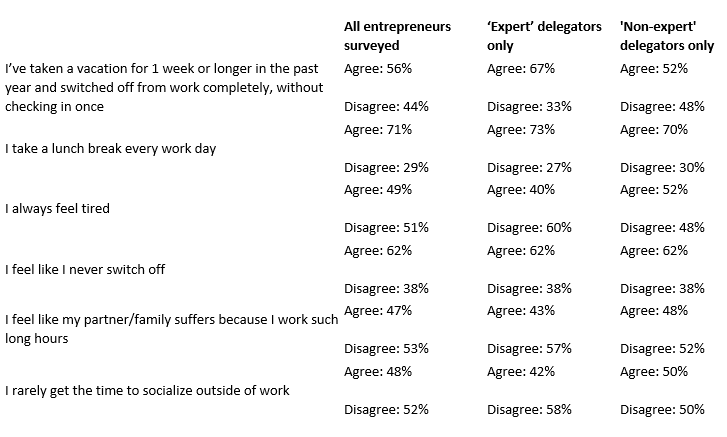
How entrepreneurs may be unwittingly keeping their businesses small
Entrepreneurs work hard, but are they maximizing their time and their potential for results, while keeping themselves healthy? A new survey by virtual assistant company Time Etc, suggests many are paying a price for failing to delegate their administrative tasks.
The data shows the average work week for entrepreneurs at the helm of growing businesses is 45.5 hours, though close to a third (29%) work more than 50 hours per week. And yet, more than a third (36%) of that week is spent performing administrative tasks. More than three in 10 entrepreneurs surveyed (31%) spend between 26-50% of their week on small admin tasks.
In a typical week, 59% log expenses, 49% do research, 45% do schedule management, 44% create invoices, 43% do data entry, 40% place orders for office supplies and equipment, 29% format documents, 27% chase late payers, 24% write content for social media posts, 20% book travel for work trips, 15% organize social events for staff, 12% write blogs and 11% buy gifts for employees.
When asked why they’re not delegating these simple, repetitive tasks, the most common reason was surprising: 27% of entrepreneurs say it’s because they actually enjoy it. In close pursuit was the feeling that, by the time instructions had been given, it would be “faster to do it myself” (25%). A further 17% say they have no one they feel they can delegate admin tasks to. Interestingly, 12% admit to having “trust issues” and 7% “control issues” around delegating tasks.
But the survey also reveals that those who identify as ‘expert delegators’ are more likely than their peers to have seen revenue and profit growth in recent times. When asked to compare revenue between their past two years of business operations, 82% of ‘expert’ delegators had seen growth compared to just 66% of the rest of the participants, or ‘non-expert’ delegators. Mean revenue growth for expert delegators was 143% but for the non experts it was 80%.
When asked about their profits in the past 12 months of trading, 85% of expert delegators reported an increase, compared to 74% of non-experts.
The inability, or unwillingness, to delegate may also be having a knock-on effect on health and wellbeing. Half (50%) of all the entrepreneurs surveyed agree they struggle to maintain a healthy work-life balance, but this drops to 43% among the expert delegators. And expert delegators exercise more on average (5 times per week) than non-experts (4 times per week).
As shown in the table below, 44% entrepreneurs have not taken a vacation where they’ve been able to switch off from work completely in the past year, a figure that drops to 33% among those who identify as expert delegators and rises to 48% among non-experts. And, when it comes to fatigue, 49% of all entrepreneurs always feel tired, compared to 40% of expert delegators and 52% of non-experts.

So what would entrepreneurs do at work with more time on their hands? Sales, marketing and differentiation were top of their wish lists:
- Grow our sales (36%)
- Do more marketing (33%)
- Work on new ways to stand out from competitors (32%)
- Get creative and have new ideas (27%)
- Develop new product / service ideas (24%)
- Grow our partnerships (21%)
- Increase my billable hours (20%)
- Mentor new starters / young workers (20%)
- Analyse data to help us make more informed decisions (19%)
- Refine our brand (18%)
Barnaby Lashbrooke, serial entrepreneur and CEO of Time Etc says: “Interestingly, 89% of the entrepreneurs we surveyed categorized themselves as ‘expert’ or ‘good’ delegators, compared to only 11% who said they were ‘poor’ or ‘very poor’ delegators. And yet, 29% of entrepreneurs work more than 50 hours per week, and the average entrepreneur spends 36% of their entire work week on administrative tasks – suggesting there’s plenty of room for improvement. The data shows entrepreneurs might well be keeping their businesses small, without realizing the powerful impact they could be having by redirecting their energy.
“It’s easy to see why entrepreneurs are drawn to tasks they can do on autopilot. Breaking down walls, firefighting and solving problems every day is draining and idling away time on small, easy tasks might help wired brains switch off, but at what cost to business growth and personal health?
“Delegating tasks is a skill, and one that often requires trust before it has been established, which is why many find it difficult. But, if you’re running a business, never be under the illusion that you’re better off doing administrative work yourself. Your time is among the most valuable in the business, so you need to be focused on tasks that directly contribute growth, and little else. Downtime is best treated as sacred, and used to focus on health, wellbeing, and relationships, or you’re dicing with burnout."

